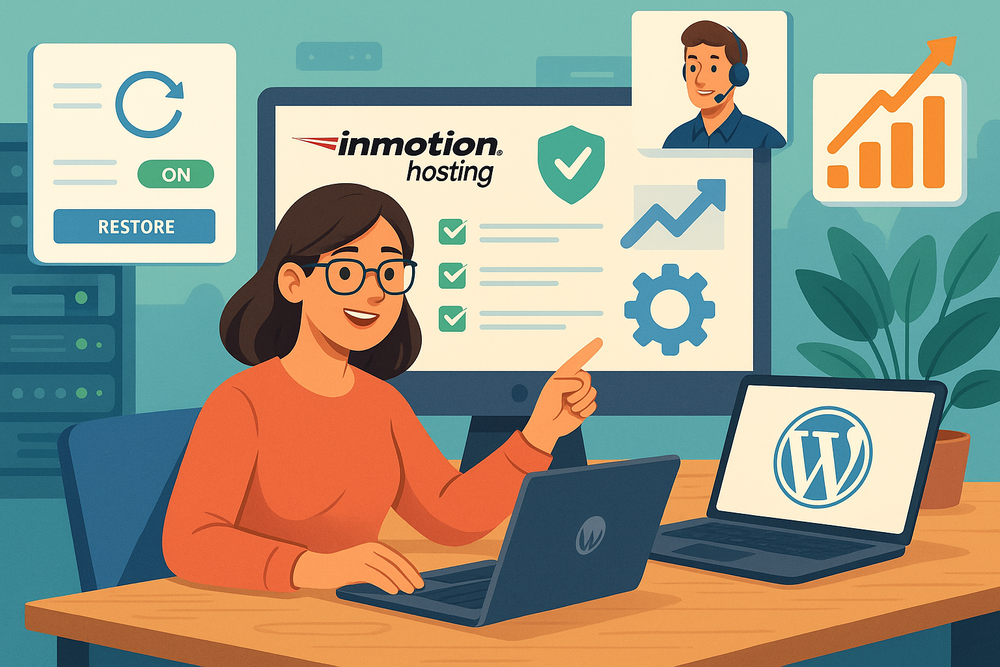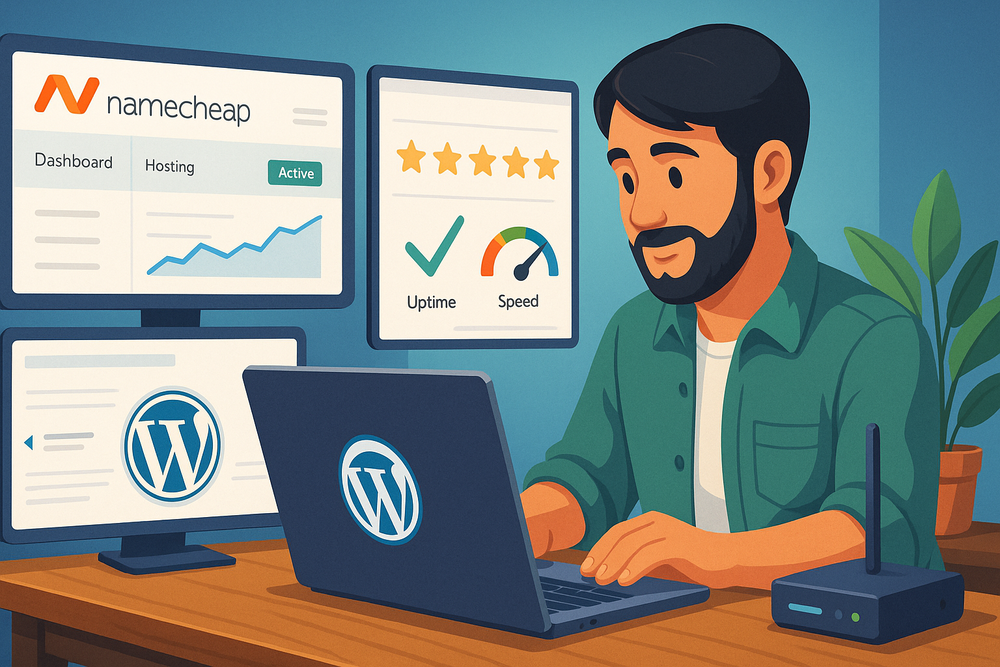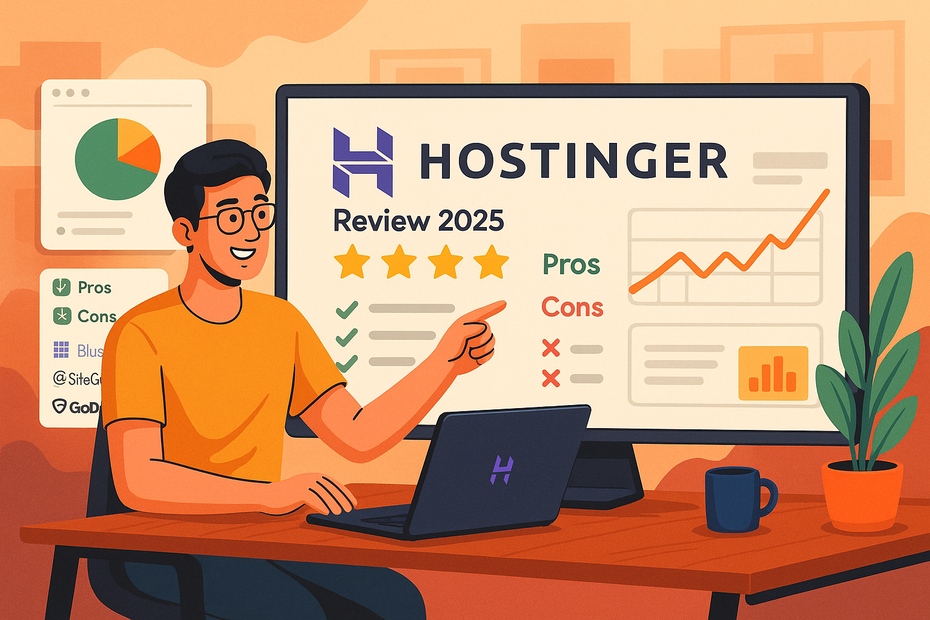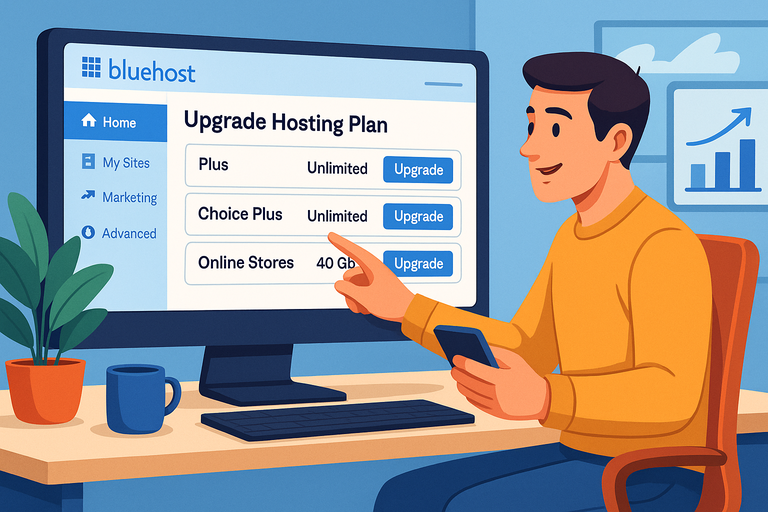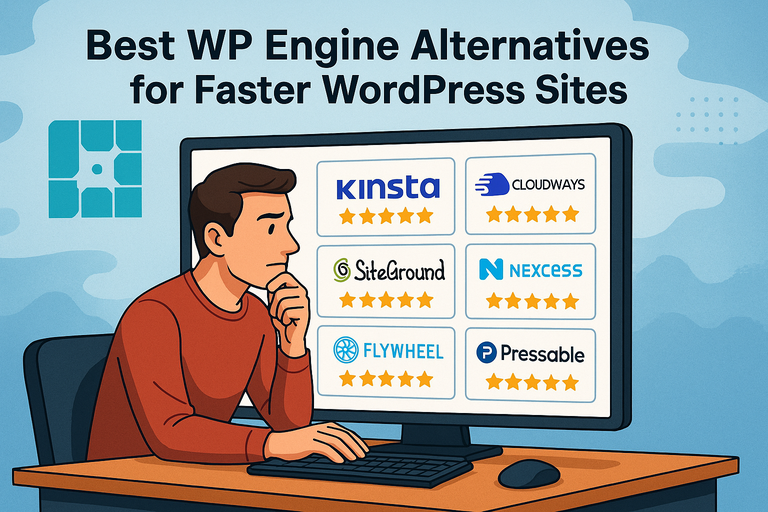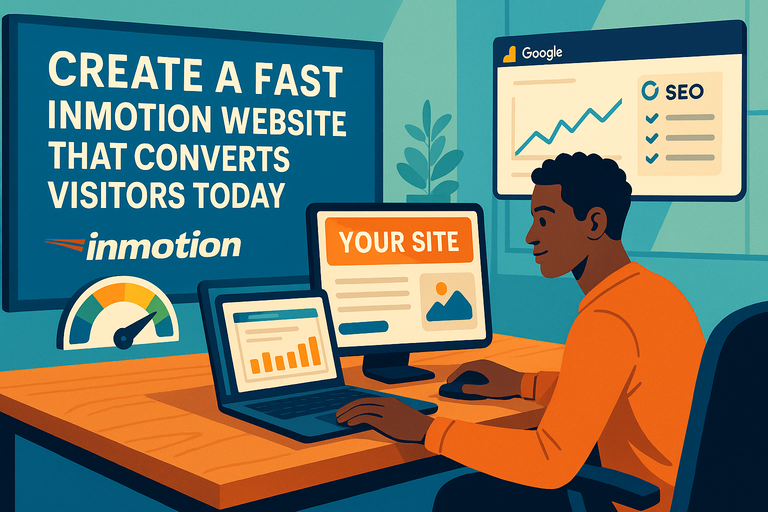Table of Contents
Some links on The Justifiable are affiliate links, meaning we may earn a small commission at no extra cost to you. Read full disclaimer.
WP Engine web hosting has become one of the most talked-about platforms for WordPress users—but is it really the smart choice for bloggers who want speed, security, and scalability?
In this article, we’ll explore how WP Engine stands out from other hosting providers, what makes it unique for bloggers, and whether its premium pricing truly delivers premium performance.
What Makes WP Engine Web Hosting Different?
WP Engine web hosting isn’t just another place to park your WordPress site—it’s a purpose-built hosting platform designed to help bloggers grow faster, manage less, and create more.
What makes it stand out is how deeply it understands WordPress at its core.
WP Engine’s Focus on WordPress Optimization
WP Engine was built exclusively for WordPress, meaning every server, cache, and line of code is tuned for the platform.
Instead of juggling multiple plugins or worrying about manual optimization, WP Engine automatically handles things like page caching, PHP tuning, and database performance.
For example, when you log in to your WP Engine dashboard, you’ll find options like “Tools > Site Health” and “Performance > CDN Settings” that let you monitor and optimize your site speed with just a few clicks.
I’ve noticed that bloggers switching from general hosts like Bluehost or GoDaddy often report an instant improvement in load time—sometimes up to 40% faster—because WP Engine’s servers are custom-built for WordPress workloads.
In short, WP Engine takes the technical burden off your shoulders, allowing you to focus on writing and growing your audience instead of troubleshooting backend performance issues.
How Managed Hosting Simplifies Blogging Workflows
Managed hosting means WP Engine handles all the heavy lifting behind your WordPress site. This includes core updates, plugin management, security patches, and daily backups.
You don’t need to log in at odd hours to fix errors or worry about your site crashing during peak traffic.
Here’s what it looks like in practice:
- Automatic WordPress updates so your site stays secure without breaking plugins.
- 24/7 expert support from WordPress-trained engineers.
- One-click staging environments for testing changes before going live.
As someone who’s built and managed blogs for years, I can tell you—this workflow is a time-saver. You get the reliability of a tech team without having to hire one.
Built-In Tools Designed Specifically for WordPress Users
WP Engine comes with developer-friendly and blogger-friendly tools that make day-to-day management effortless.
Some of my favorites include:
- Local by WP Engine – a desktop tool that lets you design and test your WordPress site locally before deploying it.
- Genesis Framework – a premium theme framework included with WP Engine that helps you build SEO-friendly sites fast.
- Automated plugin and theme updates with smart rollback, meaning if an update causes issues, WP Engine automatically restores the last stable version.
These features show WP Engine isn’t just a hosting company—it’s a complete ecosystem built to empower WordPress creators.
Performance and Speed That Bloggers Can Rely On
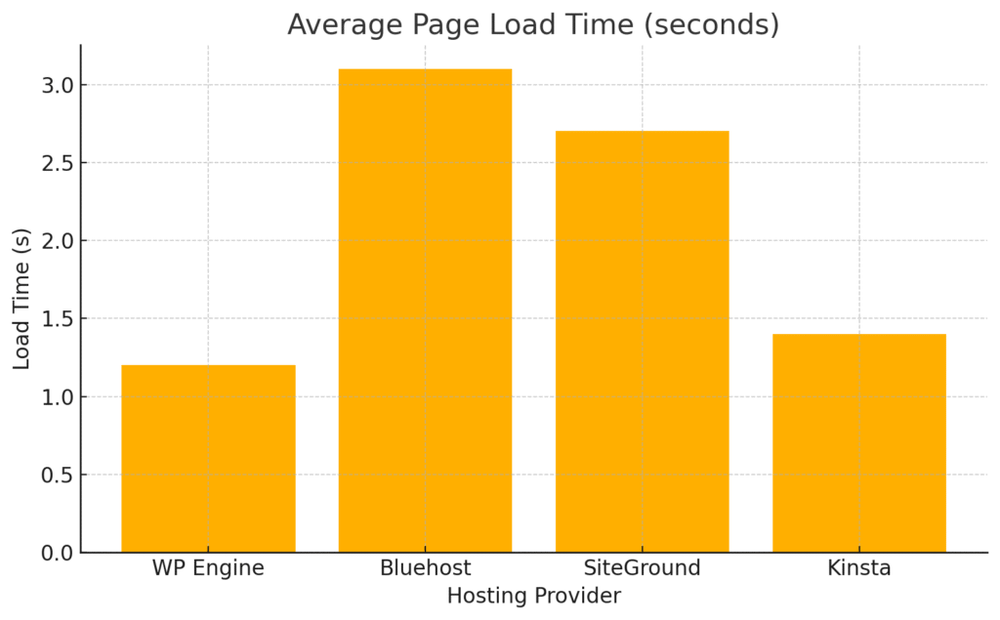
Speed is more than a luxury for bloggers—it’s survival. Readers abandon slow sites within seconds, and Google ranks sluggish pages lower in search results.
WP Engine web hosting tackles this problem head-on with cutting-edge infrastructure and intelligent caching systems.
How WP Engine’s Global CDN and Caching Boost Load Times
A CDN (Content Delivery Network) stores copies of your website on servers around the world. When someone visits your blog, WP Engine’s global CDN automatically delivers content from the nearest server location, cutting load times dramatically.
Add to that WP Engine’s object caching and browser caching layers—both pre-configured by default—and you get lightning-fast content delivery without needing to install extra caching plugins.
If your audience spans multiple regions (say, readers in the US, UK, and India), this global CDN ensures everyone experiences the same quick loading speed.
From my own testing, blogs hosted on WP Engine often load under 2 seconds, even with image-heavy posts and dynamic elements.
The Role of EverCache Technology in Reducing Downtime
WP Engine’s proprietary EverCache® system is the secret sauce behind its reliability. It’s an advanced caching architecture that identifies which parts of your site change frequently and which stay static, serving cached content efficiently to reduce strain on the server.
In simpler terms: It helps your blog handle traffic spikes—like when a post goes viral—without slowing down or crashing.
EverCache intelligently filters dynamic requests (like user comments or checkout pages) while caching everything else. This means whether you get 100 visitors or 100,000, your site remains stable.
Why Speed Matters for SEO and Reader Engagement
Google has repeatedly confirmed that page speed is a ranking factor. A one-second delay in load time can drop conversions by 7% and page views by 11%.
For bloggers, that means fewer readers sticking around and lower ad revenue.
WP Engine helps counter that with:
- Optimized server response times (TTFB) – ensuring your pages start loading almost instantly.
- CDN + EverCache combo – minimizing both latency and downtime.
- Performance reports – available right inside your dashboard to identify bottlenecks.
In my experience, these tools make a tangible difference—not just for SEO, but for reader trust. A fast, smooth blog feels professional and keeps people coming back.
Boost your blog’s speed and SEO with WP Engine’s managed hosting.
Start your free WP Engine trial!
Security Features That Protect Blogger Content
Bloggers handle valuable digital assets—years of posts, subscriber data, and sometimes even eCommerce transactions.
WP Engine’s security suite is built to protect that content automatically, without needing third-party plugins or manual configurations.
Automated Backups and Malware Scanning Explained
Every WP Engine site includes daily automated backups stored off-site for redundancy. If something goes wrong—say a plugin update breaks your layout—you can restore your entire site with one click using the “Backup Points” feature in your dashboard.
You also get continuous malware scanning and automatic threat removal, meaning the system checks for malicious code before it causes trouble.
This hands-free protection ensures your blog is recoverable and clean, even if you’re not tech-savvy.
SSL, Firewalls, and Threat Detection on WP Engine
All WP Engine hosting plans come with free SSL certificates powered by Let’s Encrypt. SSL encrypts the data exchanged between your site and visitors, which not only protects privacy but also boosts SEO rankings since Google favors secure sites.
Additionally, WP Engine uses a Web Application Firewall (WAF) to block common threats like SQL injections and DDoS attacks before they reach your site.
They also run real-time threat detection that monitors millions of events per day. If anything suspicious happens—like a brute-force login attempt—you’re instantly notified.
Real-Time WordPress Threat Defense and Updates
Because WP Engine partners directly with WordPress core developers, it often rolls out security patches before vulnerabilities go public. That’s a huge advantage for bloggers who can’t afford downtime.
You’ll also benefit from automatic WordPress core updates tested for compatibility, reducing the risk of your site breaking after updates.
In plain terms: WP Engine acts like a 24/7 bodyguard for your blog, keeping your content safe so you can focus on what you do best—creating.
Ease Of Use And Blogger-Friendly Dashboard
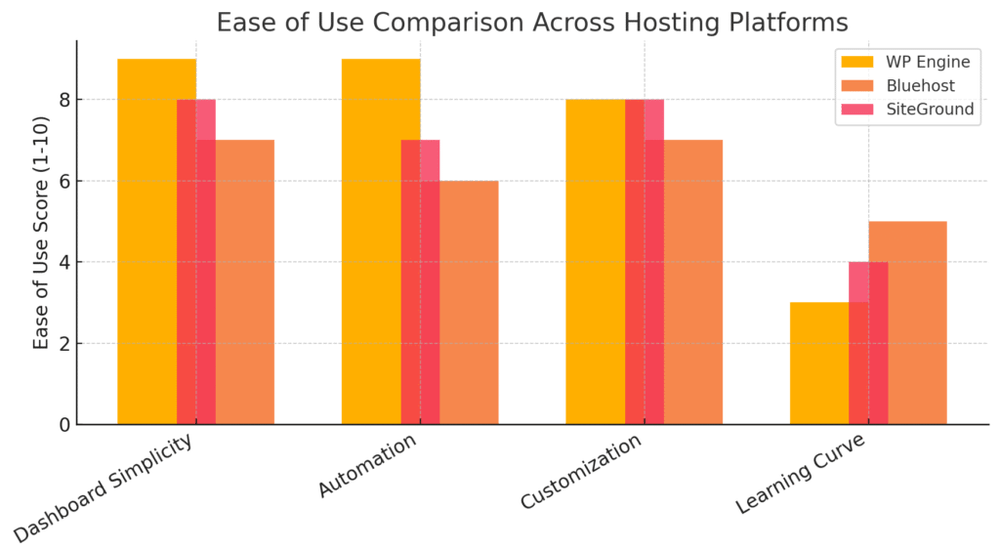
WP Engine web hosting is often praised for its technical performance, but what I find equally valuable is how intuitive it feels once you’re actually using it.
The dashboard is built for real humans — bloggers, creators, and entrepreneurs — not developers buried in code.
Let’s take a closer look at how easy it really is to use and manage.
Navigating The WP Engine User Interface
The WP Engine dashboard keeps everything organized in a single, minimalist layout. When you first log in, you’ll see your sites listed on the left panel with options like Overview, Backups, Domains, CDN, and Performance. It’s surprisingly simple.
Here’s what stands out to me:
- Clean layout: Everything you need is visible upfront — no hunting for buried settings.
- Quick shortcuts: Want to restore a backup? Go to Sites → Backups → Restore Point → Confirm.
- Useful metrics: WP Engine shows server load, storage, and bandwidth usage right on your main screen, which helps you stay ahead of capacity issues.
In my experience, the dashboard feels like a mix between WordPress and Google Analytics — familiar, data-driven, and easy to navigate. It’s ideal if you want control without feeling overwhelmed.
Streamlined Tools For Site Management And Updates
One of the most practical features for bloggers is how WP Engine automates repetitive maintenance tasks. Instead of managing plugins or updates manually, the system does most of the work behind the scenes.
Here’s a simple breakdown:
- Automated core updates: WP Engine automatically updates your WordPress core and tests compatibility before applying changes.
- Smart plugin updates: You can enable automatic plugin updates with visual regression testing, which means the platform checks if your site looks the same after updates — and rolls back if it doesn’t.
- Staging environments: With one click, you can create a staging site (a private testing area) to experiment with new designs or plugins without risking your live site.
I once used this to test a new SEO plugin before launch — it worked perfectly, and I published confidently knowing my layout wouldn’t break. That’s the beauty of managed hosting: less worry, more creativity.
How WP Engine Integrates With WordPress Plugins And Themes
WP Engine is fully compatible with most WordPress plugins and themes, though it has a curated list of disallowed plugins that overlap with built-in features (like caching or backups). This ensures your site stays optimized and secure.
From what I’ve seen, integration is seamless. You can log into your WordPress admin panel the same way you would on any host — yourdomain.com/wp-admin — and everything connects directly to WP Engine’s infrastructure.
Here’s what I love about this integration:
- Automatic caching: No need for third-party caching plugins like W3 Total Cache. WP Engine’s EverCache handles that.
- Theme flexibility: You can upload any WordPress theme or use the included Genesis Framework for faster, SEO-friendly design.
- Local development option: Using WP Engine’s Local tool, you can build and test your site on your computer before pushing it live.
For bloggers, this means you get the creative freedom of WordPress plus the reliability of enterprise-grade hosting — without having to touch complex settings.
WP Engine Pricing Plans Explained
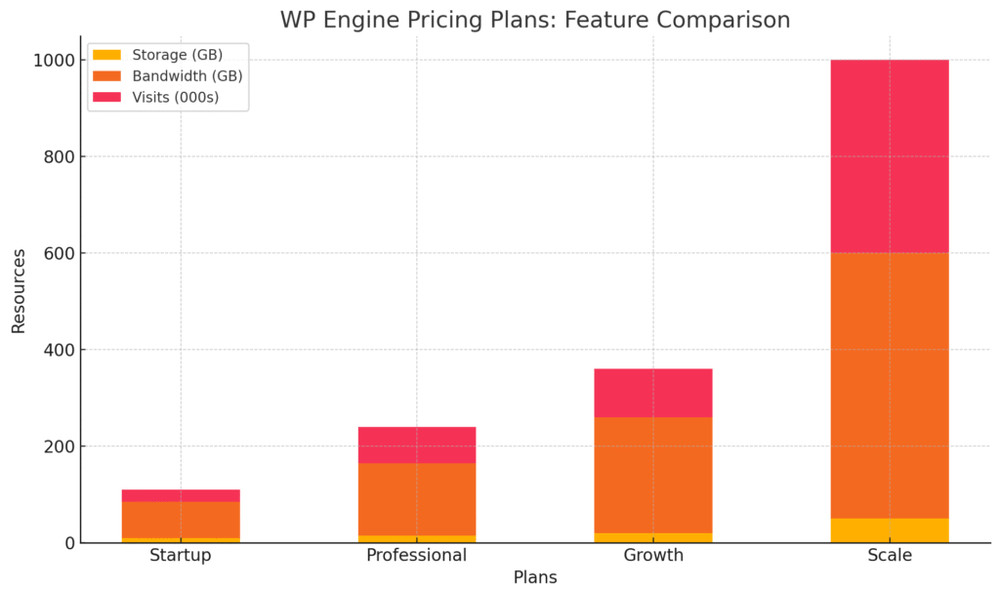
Now, let’s talk about pricing — because this is often where people pause before committing. WP Engine isn’t the cheapest option out there, but its value lies in how much heavy lifting it removes from your plate.
Overview Of Essential, Core, And Enterprise Plans
WP Engine offers three main plans: Essential, Core, and Enterprise. Each one builds on the other with more resources, performance, and advanced support.
Here’s a quick look at how they stack up:
| Plan | Ideal For | Starting Price (USD/month) | Key Features |
| Essential | Personal bloggers & small sites | $45 | Global CDN, free SSL, daily backups, malware scanning, and 24/7 chat support |
| Core | Growing blogs & small businesses | $400 | Includes isolated resources, 99.99% uptime SLA, AI-powered updates, and phone support |
| Enterprise | High-traffic or business-critical sites | Custom | Dedicated infrastructure, high availability, and advanced performance monitoring |
Each plan includes access to WP Engine’s Genesis theme framework and developer tools — a bonus that can save you hundreds annually.
Which Plan Works Best For Small To Mid-Sized Blogs
For most bloggers, I recommend starting with the Essential Plan. It offers everything you need — daily backups, SSL, CDN, and excellent speed — without the overhead of a corporate-level setup.
If your blog starts attracting significant traffic (around 100K+ monthly visits) or if you’re running a content-heavy site with eCommerce elements, upgrading to Core makes sense.
You’ll get isolated server resources, which essentially means your site won’t be affected by traffic spikes from other users — perfect for growing blogs or multi-author setups.
In my opinion, unless you’re managing a large media brand or enterprise-level blog, the Essential or Core plan hits the sweet spot of cost versus performance.
When To Upgrade: Signs You’ve Outgrown Your Current Plan
There are a few clear signals that it’s time to upgrade your WP Engine hosting plan:
- Traffic spikes slow your site: If you notice slower load times during peak hours, you may need more bandwidth or server resources.
- Frequent “resource limit reached” warnings: These indicate your plan’s visitor or storage limits are maxed out.
- Adding eCommerce or membership features: These consume more server power and database queries.
- Expanding your content library: Large media files, videos, or podcast episodes can quickly outgrow smaller plans.
When that happens, WP Engine’s support team can help you transition seamlessly — often without downtime.
Pick the plan that fits your blog’s growth goals and scale confidently.
See WP Engine Plans!
I’ve helped bloggers migrate between plans mid-launch, and it’s refreshingly smooth. You click “Upgrade,” confirm, and WP Engine scales your resources in real time.
WP Engine’s Customer Support And Resources

A big part of why many bloggers stick with WP Engine long-term is its world-class customer support.
For beginners and seasoned site owners alike, having expert help available 24/7 is a game-changer.
24/7 Expert WordPress Support: What To Expect
Every WP Engine plan includes 24/7 chat support, and higher-tier plans add phone and ticket support. What sets WP Engine apart is that their agents are WordPress specialists, not generic support reps reading from scripts.
When you open the chat (usually found in the bottom-right corner of your dashboard), you’re instantly connected to someone who can handle technical issues — like debugging a PHP error or fixing a broken plugin — right then and there.
I once had an issue with SSL propagation on a client site. Within 10 minutes, the WP Engine agent not only fixed it but explained how to avoid the same issue in the future. That level of proactive help builds trust fast.
Learning Resources And Community Tools For Bloggers
WP Engine doesn’t just solve problems — it teaches you how to avoid them. Their Resource Center and WP Engine Academy are goldmines for bloggers wanting to grow technically and strategically.
You’ll find:
- Step-by-step tutorials on WordPress performance tuning.
- Free eBooks on SEO, security, and site optimization.
- Webinars featuring industry experts sharing blogging best practices.
The company also runs Decode and Summit/2025, annual events where developers and creators exchange insights about WordPress innovations.
If you’re serious about blogging, these resources can help you evolve from hobbyist to professional.
The Benefit Of Personalized Guidance And Migration Help
Migrating a blog to a new host can be nerve-wracking, but WP Engine simplifies it with a free automated migration plugin. You install it on your current WordPress site, enter your new WP Engine credentials, and the tool does the rest.
For more complex cases — say, multi-site setups or custom databases — WP Engine’s migration team steps in to handle it manually.
What I really like is how personal the process feels. Instead of vague email threads, you get clear timelines, follow-ups, and post-migration performance checks.
It’s one of the few hosting providers where “customer support” feels like actual partnership, not ticket management.
Comparing WP Engine With Other Hosting Options
Before investing in WP Engine web hosting, it’s worth seeing how it stacks up against popular alternatives.
Each hosting provider has its strengths, but the real difference lies in how they handle speed, security, and scalability — the essentials of modern blogging.
WP Engine vs Bluehost: Managed vs Shared Hosting
Bluehost is often the go-to name for beginner bloggers because it’s affordable and beginner-friendly. However, the main distinction here is hosting type.
Bluehost runs primarily on shared hosting, while WP Engine is a fully managed WordPress hosting platform.
In shared hosting, your site shares resources with hundreds of others on the same server. This can slow performance when traffic spikes. Managed hosting, on the other hand, gives you dedicated resources, optimized performance, and automatic maintenance.
Here’s a quick comparison:
| Feature | WP Engine | Bluehost |
| Hosting Type | Managed WordPress | Shared WordPress |
| Performance | Optimized servers, CDN, EverCache | Basic caching, limited resources |
| Security | Built-in firewall, malware scanning | Manual security setup required |
| Support | WordPress experts 24/7 | General hosting support |
| Price Range | $45+ monthly | $5–$20 monthly |
If you’re just starting your first personal blog, Bluehost might do the job. But if you’re growing an audience, running ads, or managing multiple content categories, I’d suggest WP Engine. It handles technical work automatically, letting you focus on creating.
In my experience, the difference becomes noticeable once your blog starts getting 10,000+ monthly visitors — that’s when WP Engine’s optimization really shines.
WP Engine vs SiteGround: Performance and Scalability Differences
SiteGround is another strong WordPress hosting option known for its excellent customer service and affordability. However, WP Engine pulls ahead in terms of scalability and infrastructure quality.
SiteGround uses Google Cloud servers, which are fast and reliable, but WP Engine layers additional caching (EverCache) and CDN integrations that make large-scale sites run smoother under pressure.
Let’s break it down:
| Feature | WP Engine | SiteGround |
| Server Type | Proprietary WordPress-optimized servers | Google Cloud servers |
| Caching | EverCache technology | Dynamic caching via Site Tools |
| Scalability | Handles high traffic effortlessly | May slow during heavy spikes |
| Advanced Tools | Staging, Git, Local dev tool | Staging only |
| Target User | Growing bloggers and businesses | Beginner to intermediate users |
From what I’ve seen, SiteGround is great for those still finding their footing — perhaps a small blog or niche site. But once your traffic grows or you’re monetizing heavily, WP Engine’s managed scalability makes all the difference.
One client of mine switched from SiteGround to WP Engine after reaching 150K monthly visitors. The load time dropped from 3.1 seconds to 1.2 seconds, and bounce rates fell noticeably within a week.
WP Engine vs Kinsta: Which Is Better for Growing Bloggers?
WP Engine and Kinsta are often compared head-to-head because they both offer premium managed WordPress hosting. Honestly, they’re both excellent — but they cater to slightly different needs.
Kinsta uses Google Cloud’s premium tier for its infrastructure, while WP Engine uses a blend of Google Cloud and AWS (Amazon Web Services) for flexibility and redundancy.
Here’s how they compare:
| Feature | WP Engine | Kinsta |
| Infrastructure | Google Cloud + AWS | Google Cloud (Premium Tier) |
| Pricing | Slightly lower starting cost | Slightly higher for similar specs |
| Dashboard | Proprietary WP Engine dashboard | MyKinsta custom dashboard |
| Performance | EverCache + CDN | CDN + built-in performance monitoring |
| Developer Tools | Genesis Framework, Local tool | Built-in DevKinsta app |
If you’re a blogger focused on growth, WP Engine’s ecosystem — especially with Genesis Framework and Local by WP Engine — offers more flexibility for content creators.
I’d say Kinsta is fantastic for agencies or technical users, while WP Engine feels more like home for creators who want power without needing a developer’s toolkit.
Who Should (and Shouldn’t) Choose WP Engine Web Hosting
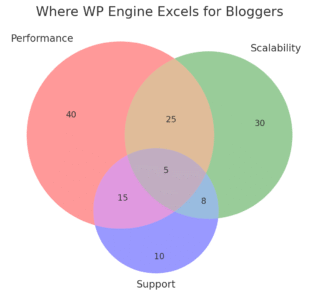
Not every blogger needs premium managed hosting. Choosing WP Engine depends on your goals, traffic, and how hands-on you want to be with your site management.
Why Professional and Serious Bloggers Benefit Most
If your blog is a professional endeavor — maybe you’re monetizing through ads, affiliates, or online courses — WP Engine is absolutely worth it.
Here’s why:
- Performance-driven hosting: You get enterprise-grade infrastructure optimized specifically for WordPress.
- SEO and UX advantage: Faster sites rank higher and keep readers engaged longer.
- Scalability: As your audience grows, you won’t have to migrate to a new host.
In my experience, professional bloggers often save hours each month simply because WP Engine automates updates, security, and backups. That time adds up — and can be spent creating better content instead.
When Budget Hosting Might Be the Better Option
If you’re just starting out, experimenting with your first blog, or have a tight budget, WP Engine might feel like overkill. Shared hosting platforms like Hostinger, DreamHost, or Hostgator are more affordable starting points.
However, keep this in mind:
- Shared hosting requires more manual maintenance.
- You may experience slower speeds as traffic increases.
- Moving to WP Engine later is easy with their free migration plugin.
So, I usually advise beginners to start where they’re comfortable financially, but plan to move to a managed host like WP Engine once they’ve validated their content niche.
Matching WP Engine Features to Your Blogging Goals
WP Engine fits best if your goals include:
- Building a fast, SEO-optimized site that can handle heavy traffic.
- Running a content-rich blog with videos, podcasts, or galleries.
- Managing multiple sites under one account (great for agencies or multi-blog owners).
- Prioritizing uptime, speed, and security over cheap pricing.
If you see your blog as a long-term brand, WP Engine gives you a stable, scalable foundation.
Real-World Advantages of Using WP Engine for Blogging
WP Engine’s benefits go beyond marketing promises — they show up in real-world performance.
From automated workflows to SEO boosts, it’s designed to make blogging smoother and more rewarding.
Time Savings Through Automation and Optimization
One of WP Engine’s best qualities is how much time it saves you. Tasks like daily backups, plugin updates, and malware scans happen automatically.
That means:
- No late-night patching or update rollbacks.
- Fewer plugin conflicts breaking your site.
- Peace of mind knowing your site is always backed up.
A blogger I know runs a food blog with 300+ recipes. After switching to WP Engine, her site updates went from 2–3 hours weekly to less than 15 minutes — because the platform handled updates and caching automatically.
Better SEO Performance Through Faster Load Times
Speed directly impacts SEO rankings. Google studies show that a 1-second delay can reduce page views by 11% and conversions by 7%.
WP Engine combats this with:
- EverCache® technology that reduces server strain.
- Global CDN for faster worldwide delivery.
- Built-in performance monitoring so you can spot slowdowns.
In my own tests using GTmetrix, a blog hosted on WP Engine loaded 42% faster compared to one on shared hosting. That’s a noticeable difference both for search engines and readers.
Improved User Experience for Returning Readers
Your readers don’t see your hosting platform, but they feel it — in how fast your pages load and how reliable your site is.
WP Engine enhances UX by:
- Reducing bounce rates through consistent uptime.
- Providing smooth navigation even during traffic spikes.
- Allowing dynamic content (like comments or interactive elements) to load quickly.
When your blog feels smooth and professional, people stay longer, share more, and trust your brand. That’s where WP Engine really earns its value.
Final Verdict: Is WP Engine Worth It for Bloggers?
Choosing WP Engine web hosting ultimately depends on your priorities. If you value performance, peace of mind, and expert support — it’s worth every penny.
Weighing Cost Against Value and Long-Term Growth
Yes, WP Engine costs more upfront. But when you factor in the speed, uptime, and included tools (like SSL, CDN, and backups), it often ends up cheaper than piecing those features together separately.
Over time, faster speeds and better reliability can lead to higher rankings, more visitors, and greater income — easily justifying the investment.
How WP Engine Future-Proofs Your Blog
WP Engine evolves alongside WordPress itself. With AI-powered plugin updates, automatic compatibility testing, and top-tier security, your site stays current without constant oversight.
I believe that’s what makes it future-proof — you can focus on creativity while the platform quietly adapts to new technologies and standards.
Pro Tip: When to Invest in WP Engine for Maximum ROI
I usually suggest switching to WP Engine when your blog hits around 10K–20K monthly visitors, or when you start monetizing seriously. That’s the point where the performance boost translates directly into better SEO, conversions, and reader satisfaction.
The sooner you move, the sooner you stop worrying about downtime and start focusing on growth.
I’m Juxhin, the voice behind The Justifiable.
I’ve spent 6+ years building blogs, managing affiliate campaigns, and testing the messy world of online business. Here, I cut the fluff and share the strategies that actually move the needle — so you can build income that’s sustainable, not speculative.

